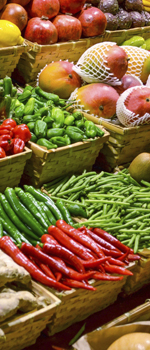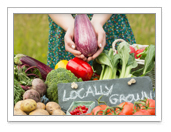
|
Follow Me On: |
 |
Roy Sperr Jason Walters and Shawn Hunter NMLS: 202418/295556/348864 Equity Source Mortgage, Inc. Phone: Roy (763) 657-2012 Phone: Shawn (763) 657-2017 Emails: roy@equitysourcemortgage.net roy@equitysourcemortgage.net www.equitysourcemortgage.com |
 | ||
| ||||
November 2014

|
8 Ways to Beat Rising Food Prices By Cameron Huddleston, Kiplinger.com
Even if those items aren't on your shopping list, you still might pay more at checkout. The Kiplinger Agriculture Letter expects food prices across the board to increase 2.5% in 2015, on top of a projected 3% increase this year. However, there are ways to keep the cost of groceries under control. Follow these eight steps to beat the rising price of food. Stock up during sales. It's always a good money-saving strategy to stock up when nonperishable items and food that can be frozen go on sale. This strategy can pay off even more if prices on items you regularly buy are expected to rise. Check the supermarket's Web site for its weekly ad or grab its circular as you enter to find out what's on sale. Even if you're not out of the items that are on sale, go ahead and buy them at the lower price to hedge against price hikes if you have room to store them. Buy the store brand. You can save a lot by buying the store brand, so it's time to reconsider your loyalty to certain name brands. For example, during a recent shopping trip, I noticed that many brand-name packages of bacon were selling for about $6. But the comparable store brand had a retail price of $4—and on sale at that time for $3.50. That's a $2.50 savings over the brand-name bacon. Become a coupon maven. Some people take couponing to the extreme. But don't worry: You don't have to give up your entire weekend to clip coupons so you can score savings at the supermarket. Many stores make it easy to find coupons on their sites and load them directly to your loyalty card (which you should get if you don't already have one). Or download the store's app for savings on the go. Many supermarkets' apps offer exclusive discounts in addition to manufacturers' coupons. Look for alternatives. Oranges aren't the only source of vitamin C. Foods such as kale, broccoli and Brussels sprouts also are rich in vitamin C and other vitamins found in fresh fruits. You should be able to find good prices on these vegetables in the fall because that's when they're in season. If you're a meat eater, you might not want to settle for a lower-priced vegetarian alternative such as beans or tofu. However, you can beat the rising cost of beef, pork and poultry by avoiding pricier cuts such as steaks, pork tenderloin and skinless chicken breasts. Instead, opt for ground beef, ground pork and whole chickens, the latter of which can cost several dollars less per pound than chicken breasts. Take advantage of holiday discounts. Chocolate lovers can score big savings if they wait until after Halloween to stock up on deeply discounted treats that didn't sell by October 31. When frozen turkeys go on sale in November, buy more than just the one you need for your Thanksgiving meal. If you buy turkey rather than chicken, just think of all the leftovers you'll have. Don't be afraid to haggle. Ask a store manager for discounts on items that are near the "sell by" date. The expiration date you see on a product is the manufacturer's estimate for freshness, not the drop-dead date by which the product must be sold. Other than infant formula, there's no requirement that products must be sold by the expiration date, according to the U.S. Food and Drug Administration. However, shoppers might be reluctant to purchase goods near expiration dates, which offers leverage to bargain hunters. A Harvard researcher who co-authored a study about food labeling said that, generally speaking, shoppers can add five to seven days to the expiration date. (See Confusing Packages Lead to Wasted Food, Money.) Shop around. If you do your grocery shopping at a store that's already pricier than others, you'll likely feel an even bigger blow to your budget when food prices spike. So consider switching to a lower-priced grocer for most of your everyday needs, but work in trips to other retailers that have the best prices on specific items. For example, although Whole Foods does have good deals on a few items such as organic milk, Trader Joe's sells many comparable goods for less. And you can often save a lot by buying meat and poultry in bulk at a warehouse club rather than in small quantities at the supermarket. (See Best Buys at Warehouse Clubs, Grocers and Big Box Stores.) Buy local. If you live in a region that isn't drought-stricken, you might find better prices at the farmers market than at the supermarket, where food is shipped in from distant states (and countries) that might have crop shortages due to weather conditions. Try these tips for getting the best deals at the farmers market. The Kiplinger Washington Editors. Kiplinger.com. | ||||||||||||||||||||||||||||||
You are receiving a complimentary subscription to YOU Magazine as a result of your ongoing business relationship with Roy Sperr Jason Walters and Shawn Hunter. While beneficial to a wide audience, this information is also commercial in nature and it may contain advertising materials. INVITE A FRIEND to receive YOU Magazine. Please feel free to invite your friends and colleagues to subscribe. SUBSCRIBE to YOU Magazine. If you received this message from a friend, you can subscribe online. UNSUBSCRIBE: If you would like to stop receiving emails from Roy Sperr Jason Walters and Shawn Hunter, you can easily unsubscribe. Equity Source Mortgage, Inc. |
19230 Evans St NW, Suite 100 Elk River, MN 55330 Powered by Platinum Marketing © Copyright 2024. Vantage Production, LLC. | |||||||||


